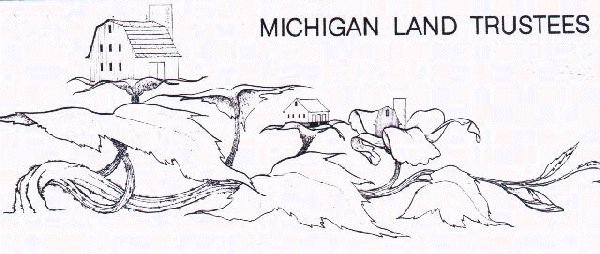
Dear Michigan Land Trustees:
The second annual meeting of the Michigan Land Trust will be held at the MLT farm in Bangor at 7:50, Sunday, October 10, 1982. Since most of the Directors' terms run out with this meeting, we will need to elect new directors to carry on the work of MLT during the coming year. In addition, we rely on the annual meeting for input and direction from the Trustees to the Board. Therefore it is most important that all the Trustees come to this meeting. This year the homesteading farm has experienced decreased enrollments and, as a result, a number of alternative plans for use of the farm have surfaced, we need to evaluate these alternatives and decide which conform toour long term goals.
The concept of a Land Trust is still somewhat unclear or undefined to many of us. Because we are all otherwise employed at our jobs, on our homesteads, in our communities, with our families, etc., the Land Trust suffers from lack of a small, high energy base or a larger base of lower level but consistent energy from which to operate. We are attempting to deal with this problem while, at the same time, recognizing the limitations of an organization such as ours. We are attempting to set goals that are realistic and attainable while at the same time ones significant to our own lives and effective in our communities. There has been some discussion at recent Board meetings about trimming the "dead wood" in our organization so there is room for young, fresh, energetic new growth. These ideas and others will all need to be discussed at this second annual meeting.
Please come!
CONDOS, CORNFIELDS AND HOMESTEADS: THE NEW RURAL PRESIDENTS
AND LAND USE
During the past ten years, for the first time, more people moved from cities to the countryside than the reverse. This important and unprecedented trend in American society could change the structure of agriculture and blur the distinction between urban and rural. It raises many questions: are the new rural residents taking too much land out of production agriculture? How will it affect soil conservation efforts? What will happen to small "town life under the impact of rural urbanisation? Will crime and pollution increase in rural areas? Can a new form of agriculture compatible with the urban fringe be developed? These and other issues will be discussed in a one-day workshop being planned to explore the human values represented in this migration turnaround and its impact on land use.
The workshop is free and open to the public. It will be of special interest to farmers, rural residents, local planning officials, realtors and citizens who are concerned about how we use our land, a resource in limited supply.
The program is structured to generate discussion and audience participation. Dr. Craig Harris, a rural sociologist, from Michigan State University, will make the first presentation on the historical and factual background of the "loss of farmland" issue. After this backround information the program will continue with three panel discussions.
The first panel will discuss some of the different factors which motivate people to move "to the country or from it: "Cultural Values in Rural Migration." After lunch a panel will discuss "Land Losses and Land Use Conflicts." Here the emphasis will be on the impact of the migration turnaround on rural areas and on agricultural productivity. The final panel discussion, "Alternatives for the Future," will consider some new possibilities which emerge in this population shift. Resource persons on the panels include scholars from the humanities, social scientists,farmers, and a soil conservationist.
The program will be held on Saturday, November 13, 1982, from 9:00 AM to 4:15 PM. The place is the Village Playhouse in Paw Paw, Michigan, on Red Arrow Highway about two blocks east of where it intersects with M-40 in the center of town. Lunch will be brown bag or in local restaurants. Coffee will be available during breaks before and after lunch.
Tne program is co-sponsored by the Institutute of Public Affairs at Western Michigan University and Michigan Land Trustees. The Van Suren Soil Conservation District is a cooperating organization. The workshop is funded by a grant from the Michigan Council for the Humanities.
The November Michigan Land Trust Newsletter will feature highlights of the conference, "Condos, Cornfields and Homesteads." All Trustees whose last contribution of $5.00 or more per person, was received after June 1, 1981, will continue to receive the Newsletter. All contributions to Michigan Land Trustees are tax deductible.